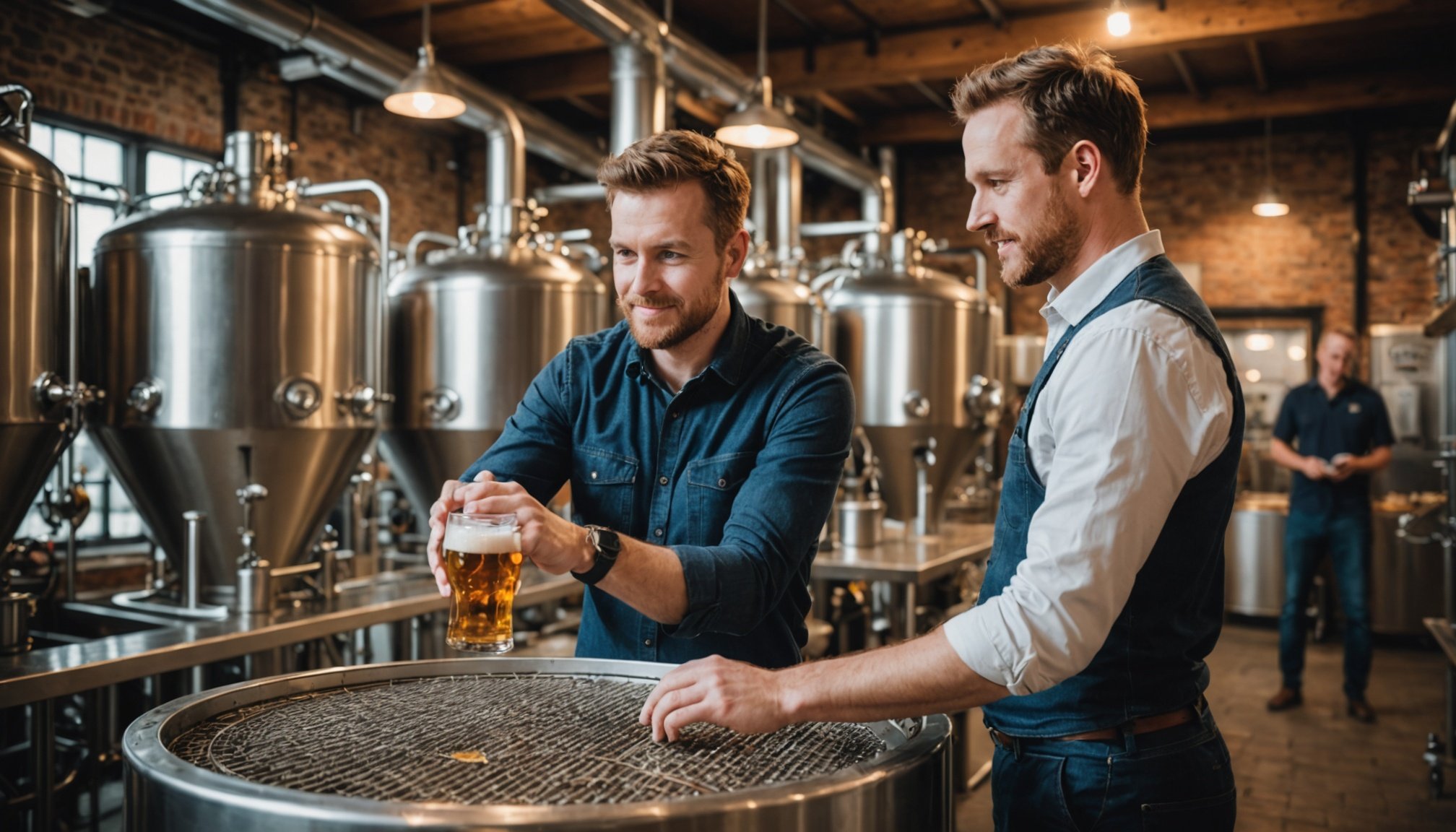Transforming Quality Assurance: Cutting-Edge AI Solutions for Breweries in the UK
The brewing industry, particularly in the UK, is undergoing a significant transformation driven by advances in artificial intelligence (AI) and digital technologies. These innovations are revolutionizing the way breweries operate, from production and quality control to supply chain management. Here’s a deep dive into how AI is transforming quality assurance in UK breweries.
The Need for Digital Transformation in Brewing
The brewing industry is highly competitive and heavily regulated, making quality assurance a critical component of any brewery’s operations. Traditional methods of quality control, while effective, can be time-consuming and prone to human error. With the rise of digital technologies, breweries are now embracing AI and other digital solutions to enhance efficiency, accuracy, and overall quality.
Also read : Empowering female entrepreneurs in the uk: success stories and tips
Industry Challenges
Before delving into the solutions, it’s essential to understand the challenges breweries face:
- Consistency and Quality: Ensuring every batch of beer meets the highest quality standards.
- Regulatory Compliance: Adhering to strict food and beverage regulations.
- Efficiency and Cost: Minimizing production costs while maximizing output.
- Supply Chain Complexity: Managing a complex supply chain to ensure timely and reliable delivery of raw materials.
AI Solutions in Quality Control
AI is being integrated into various aspects of brewery operations to address these challenges.
Also read : Successful entrepreneur: the inspiring biography of kabir mulchandani
Real-Time Monitoring
AI-powered sensors and IoT devices can monitor the brewing process in real-time, detecting any anomalies or deviations from the desired parameters. For example, temperature and pH levels can be continuously monitored to ensure they remain within the optimal range.
- Temperature Monitoring: AI can alert brewers if the temperature deviates from the set range, preventing spoilage or inconsistent flavor.
- pH Level Control: Real-time pH monitoring ensures the beer fermentation process is optimal.
- Yeast Health: AI can analyze yeast health and performance, predicting potential issues before they affect the batch.
Predictive Maintenance
Predictive maintenance is another area where AI excels. By analyzing data from various sensors and equipment, AI can predict when maintenance is required, reducing downtime and increasing overall efficiency.
- Equipment Failure Prediction: AI algorithms can analyze data to predict when equipment is likely to fail, allowing for proactive maintenance.
- Resource Optimization: By optimizing maintenance schedules, breweries can reduce energy consumption and extend the life of their equipment.
Quality Prediction and Optimization
AI can analyze historical data and real-time inputs to predict the quality of the beer before it is even bottled. This allows breweries to make adjustments in real-time to ensure the highest quality.
- Flavor Profiling: AI can analyze the chemical composition of the beer to predict its flavor profile and make necessary adjustments.
- Batch Consistency: By comparing current batch data with historical data, AI can ensure consistency across batches.
Case Study: Heineken’s AI Implementation
Heineken, one of the world’s largest brewing companies, has been at the forefront of adopting AI solutions. Here’s how they are leveraging AI:
Data-Driven Decision Making
Heineken uses AI to analyze vast amounts of data from their brewing processes. This data includes everything from ingredient quality to fermentation times.
- Ronald den Elzen, Heineken's Global Director of Brewing, commented: "AI allows us to make data-driven decisions that were previously based on intuition or manual analysis."
Automated Quality Control
Heineken has implemented AI-powered quality control systems that automate the monitoring of beer quality. This includes automated tasting and chemical analysis.
- "With AI, we can ensure that every batch of beer meets our high quality standards without the need for manual tasting," said den Elzen.
Supply Chain Optimization
AI is not just limited to the brewing process; it also plays a crucial role in supply chain management.
Predictive Analytics
AI can predict demand and supply chain disruptions, allowing breweries to plan ahead and ensure a smooth flow of raw materials.
- Demand Forecasting: AI can analyze historical sales data and external factors like weather and economic trends to predict demand.
- Supplier Performance: AI can evaluate supplier performance and predict potential disruptions, enabling proactive measures.
Inventory Management
AI can optimize inventory levels by analyzing real-time data on stock levels, production schedules, and supplier lead times.
- Just-In-Time Inventory: AI ensures that raw materials are ordered just in time, reducing inventory costs and minimizing waste.
- Automated Reordering: AI can automatically reorder supplies when levels fall below a certain threshold.
Table: Comparing Traditional vs. AI-Driven Quality Assurance
| Aspect | Traditional Method | AI-Driven Method |
|---|---|---|
| Monitoring | Manual checks by brewers | Real-time monitoring by AI-powered sensors |
| Predictive Maintenance | Scheduled maintenance based on calendar | Predictive maintenance based on real-time data analysis |
| Quality Prediction | Post-production quality checks | Real-time quality prediction and optimization |
| Supply Chain Management | Manual forecasting and inventory management | Predictive analytics and automated inventory management |
| Efficiency | Higher risk of human error and downtime | Reduced risk of human error and optimized production schedules |
| Cost | Higher costs due to manual processes and potential waste | Lower costs due to optimized processes and reduced waste |
Practical Insights and Actionable Advice
For breweries considering the adoption of AI solutions, here are some practical insights and actionable advice:
Start Small
Begin with a pilot project to test the efficacy of AI in a specific area of your operations. This could be as simple as implementing AI-powered temperature monitoring.
Invest in Data Infrastructure
Ensure you have a robust data infrastructure in place to support AI applications. This includes high-quality sensors, reliable data storage, and advanced analytics tools.
Train Your Staff
Invest in training your staff to work effectively with AI systems. This includes understanding how to interpret AI-generated data and how to integrate AI into existing workflows.
Collaborate with Experts
Collaborate with AI experts and other breweries that have successfully implemented AI solutions. This can provide valuable insights and best practices.
The integration of AI into brewery operations is a game-changer for the industry. From real-time monitoring and predictive maintenance to quality prediction and supply chain optimization, AI is enhancing efficiency, accuracy, and overall quality. As the brewing industry continues to evolve, embracing AI and digital solutions will be crucial for staying competitive and ensuring the highest quality beer for consumers.
In the words of Ronald den Elzen from Heineken, “AI is not just a tool; it’s a partner in our journey to produce the best beer possible. It’s about leveraging technology to enhance our craft, not replace it.” As breweries in the UK and around the world continue to adopt these cutting-edge solutions, the future of brewing looks brighter than ever.











